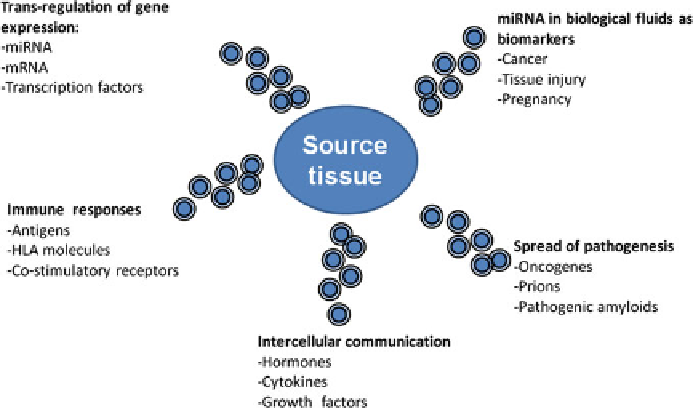Biology Reference
In-Depth Information
Fig. 9.2
Exosomes in health and disease. Summary of known biological functions of exosomes in
trans-regulation of gene expression, immune responses and intercellular communication, their role
in the spread of pathogenesis, and their exploitation as biological disease biomarkers
these circulating exosomes have been proposed to indicate survival and therapeutic
outcome in human cancers [
61
] .
As a natural biological product, exosomes hold great potential as a therapeutic
tool. Exosomes from peritoneal cavity fluid in cancer patients can induce lysis of
tumor cells as they prime T lymphocytes via an MHC I-dependent pathway involv-
ing dendritic cells and stimulate antigen-specific cytotoxic T cell responses [
62
] .
Dendritic cell-derived exosomes loaded with antigenic peptides from human mela-
noma have been used as a cancer vaccine in a phase I clinical trial supporting their
safety [
63
]. In addition, exosomes hold great promise as an alternative to stem cell
treatment for cardiovascular disorders as injections of exosomes derived from mes-
enchymal stem cells are capable of ameliorating symptoms following myocardial
infarction-reperfusion injury [
64
]. Direct exosome delivery could eliminate any
safety and technical issues associated with stem cell transplantation. Figure
9.2
is a
schematic diagram summarizing the known biological functions of exosomes in
health and disease, as well as their therapeutic and diagnostic applications.
9.3.4
Membrane Vesicles as Natural Carriers
of Protein and RNA
A variety of classes of protein and RNA have been identified in MVs/exosomes
from various cell types and body fluids. An overview of identified molecules present
in exosomes is provided in the ExoCarta database, an exosomal protein and RNA

Search WWH ::

Custom Search